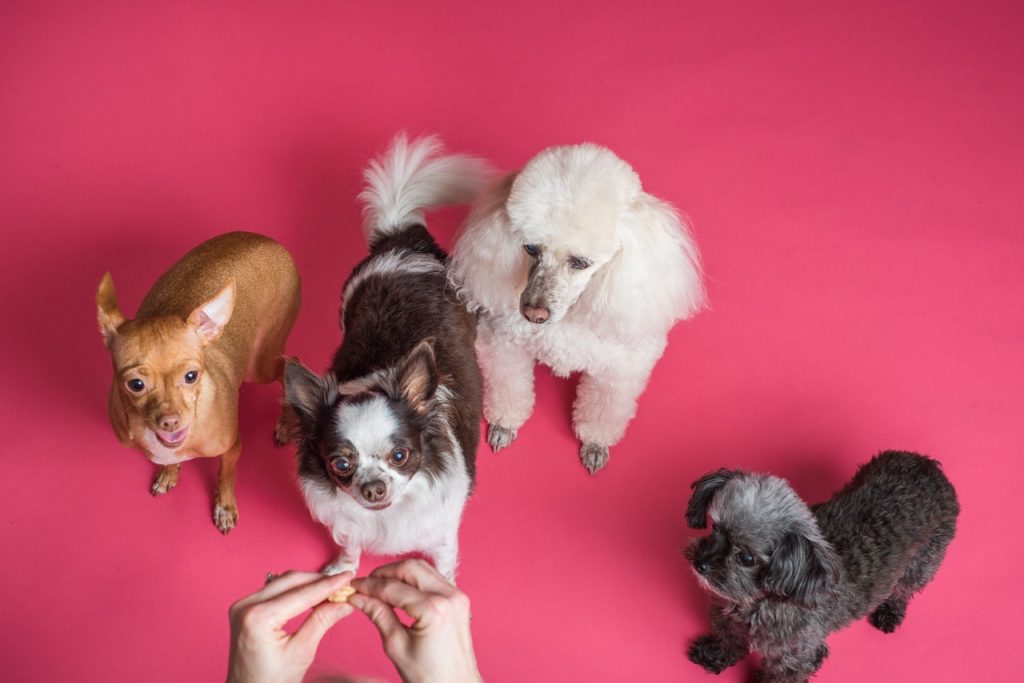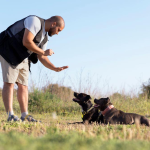Looking to adopt a dog, but not sure which breed to get? Dog breeds come in all shapes and sizes — and they each have their own temperaments and quirks. Below are a few questions to ask yourself to help you determine which breed is right for you. You can also check out dogblog.com for more tips on choosing the right dog for you and your family.

Big Dog Or Small Dog?
Most people have a certain size dog in mind. Some of the biggest dogs can weigh over 200 pounds and can stand over 30 inches tall, while some of the smallest dogs can weigh less than 20 pounds and stand less than 13 inches.
Great danes, Irish wolfhounds, and bull mastiffs are among some of the biggest breeds. These large hunting dog breeds are ideal if you are looking for a big pet.
Some of the smallest breeds include pomeranians, pugs, and chihuahuas. These are your more typical ‘lap dogs’ and may be easier to handle.
What Is Your Budget?
Some dog breeds are more expensive to buy and own than others. This could be worth considering if you are on a tight budget. There are some affordable ones like pugs in Pennsylvania.
When it comes to adoption fees, the likes of chow chows, lowchens, and rottweilers can sell for as much as $8000 — this is due to their high demand and relative scarcity. American foxhounds can meanwhile sell for as little as $100 — such breeds are less popular but not incredibly difficult to find.
The costs in the long run can vary from breed to breed. Some dogs require a lot of food such as bull mastiffs and great danes, while greyhounds and pugs require relatively little. Meanwhile, some breeds such as labradors and boxers are more susceptible to health problems, resulting in potentially higher vet bills, while breeds like beagles and poodles experience relatively few health problems.
How Much Exercise Are You Prepared To Do?
Some dog breeds require longer walks than others. This is important to factor in when considering your lifestyle — do you have the time, energy and motivation to go on long walks, or would you prefer to keep walks short.
Breed such as huskies and border collies are ideal for dog owners that want to stay active. Such breeds love long hikes and need about a minimum of 2 hours exercise per day.
Bulldogs, greyhounds and pugs can meanwhile get by with only a 20 minute walk per day. These are ideal dogs for less active owners.
Have You Got Kids?
Most breeds can be trained to get along with kids. However, some breeds are naturally better suited to a family environment.
Labrador retrievers, beagles and vizslas tend to have the all-round best temperament for households with kids — they are typically playful, affectionate, and obedient.
You should be more careful with smaller breeds like chihuahuas and pugs (they could get easily stepped on). Breeds such as huskies and akitas meanwhile have a penchant for rough play so may be better avoided with young kids.
Have You Got Other Pets?
You want to be certain that your canine companion will get on with any other pets. While training can also play a part here, there may be some breeds that are naturally better at living alongside other animals.
Some of the best dog breeds for homes full of pets include beagles, labrador retrievers, basset hounds, and pugs. These breeds tend to be very mellow and will not put other pets in distress.
The likes of rat terriers and whippets are not advised if you have small animals as it can bring out their predatory instincts (such breeds were bred for hunting). Greyhounds that have previously been bred for racing should meanwhile be avoided if you have any smaller pets.
Is Hair Shedding An Issue?
Another important thing to consider is hair shedding. A dog that sheds a lot of fur may be more likely to promote allergies. You will also have to do a lot more vacuuming and grooming.
Siberian huskies, German shepherds, and chow chows are all adored for their furry coats. However, they are big hair shedders, so you need to be willing to put up with this.
In contrast, the likes of the Afghan hound and bichon frise do not shed at all and are ideal if you do not want fur all over the house (their coats do need to be regularly combed and washed however).
Do You Need A Therapy Dog?
If you are suffering from anxiety, depression, or another mental illness, an emotional support dog breeds for depression can be recommended by a licensed mental health professional. Some breeds are better for this role than others.
Labradors are one of the most obedient and affectionate breeds and as a result tend to make perfect emotional support dogs. The likes of this page shows you where you can find such dogs for sale. Yorkshire terriers, corgis, and beagles are other popular breeds.
Akitas, huskies and rottweilers are a few breeds that tend not to make great therapy dog breeds. They can be quite high maintenance and can be more difficult to tame, making them less suitable for those looking for an animal that will ease their stress.
Are You Looking For A Guard Dog?
Worried about intruders breaking into your home? Certain breeds are more likely to scare off thieves and unwanted guests, making them excellent guard dogs.
German shepherds, staffordshire terriers, dobermans, and rottweilers are a few of the most typically guard dog breeds. They have a reputation for being fiercely protective of their owners — most burglars will think twice before breaking into a property that contains one of these dogs.
Basset hounds, pugs, and old english sheepdogs are among some of the most docile and least intimidating breeds of dogs. While they can make loving pets, they are not suitable if you’re looking for a guard dog.
What About A Mixed Breed Dog?
Pure breed dogs are not the only option when looking for a dog. You could also consider looking into mixed breeds — these are a combination of various breeds.
Mixed breeds can have various benefits. They tend to encounter less health problems, because they have not been interbred for generations. Mixed breeds are also cheaper to adopt than most pure breeds.
These are not to be confused with ‘designer’ mixed breeds such as cockapoos and pomskies. These breeds can still have many of the health problems inherited from their ancestors and tend to still fetch a high price. They may however be a good option for those that cannot decide between two breeds and want to blend the characteristics of both.
Something To Remember When Choosing A Breed…
It is important to remember that breed is not everything and upbringing can have a big impact on a dog’s demeanor.
For instance, how you train your dog can affect how it responds to people and pets. If you are taking on a rescue dog, you may have to accept that there are some behavioral problems that will need to be ironed out that may not even be typical of the dog’s breed.
It is also important to remember that no dog is zero maintenance — every breed needs to be walked, groomed, and given a good diet. Every dog comes with its costs too. A healthy lifestyle may be able to reduce visits to the vets, but you should still make sure that you have the financial means to get your dog treated if necessary.







